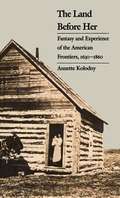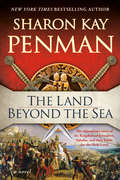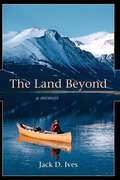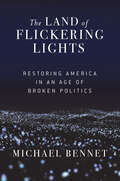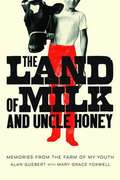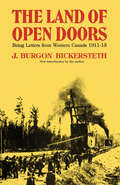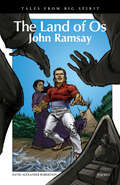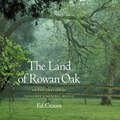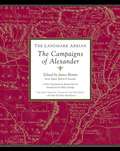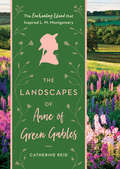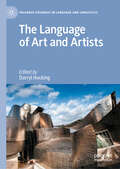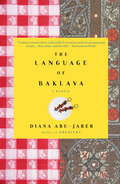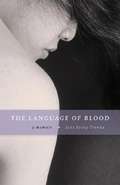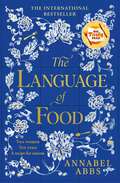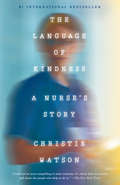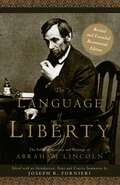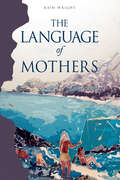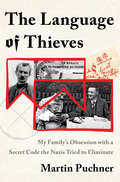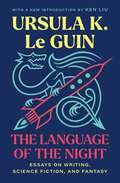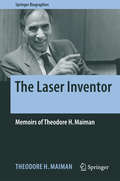- Table View
- List View
The Lance and the Shield: The Life and Times of Sitting Bull
by Robert Marshall UtleyA new biography of the Lakota Sioux chief, drawing on original notes made in the 1920s and 1930s by Stanley Vestal, who transmuted them into an essentially literary accomplishment, Sitting Bull: Chief of the Sioux. Utley corrects misconceptions and enhances understanding by looking closely at the Hunkpapa world and at the details of the chief's life. Annotation c. by Book News, Inc., Portland, Or.
The Land Before Her: Fantasy and Experience of the American Frontier 1630-1860
by Annette KolodnyPreface The purpose of this study is to chart women's private responses to the successive American frontiers and to trace a tradition of women's public statements about the west. The attention accorded letters and diaries should not suggest that this is a study of the daily lives of pioneer women, however. Nor should the analysis of three centuries of published materials suggest that I have attempted any definitive literary history. Although I have made extensive use of letters and diaries composed between 1630 and 1860, I have not attempted a revisionist history of the westward movement as seen through the eyes of women. Such a history is nonetheless long overdue, and I sincerely hope my chapters may encourage further work toward that end. In that event, my contribution may be the reminder that white women began as pioneers to this continent in the seventeenth century. Only by acknowledging the fullness of that history will we be able to grasp the continuities linking later generations with what had gone before.
The Land Beyond the Sea
by Sharon Kay PenmanFrom the critically acclaimed New York Times bestselling author Sharon Kay Penman comes the story of the reign of King Baldwin IV and the Kingdom of Jerusalem's defense against Saladin's famous army.The Kingdom of Jerusalem, also known as Outremer, is the land far beyond the sea. Baptized in blood when the men of the First Crusade captured Jerusalem from the Saracens in the early twelfth century, the kingdom defined an utterly new world, a land of blazing heat and a medley of cultures, a place where enemies were neighbors and neighbors became enemies.At the helm of this growing kingdom sits young Baldwin IV, an intelligent and courageous boy committed to the welfare and protection of his people. But despite Baldwin's dedication to his land, he is afflicted with leprosy at an early age and the threats against his power and his health nearly outweigh the risk of battle. As political deception scours the halls of the royal court, the Muslim army--led by the first sultan of Egypt and Syria, Saladin--is never far from the kingdom's doorstep, and there are only a handful Baldwin can trust, including the archbishop William of Tyre and Lord Balian d'Ibelin, a charismatic leader who has been one of the few able to maintain the peace. Filled with drama and battle, tragedy and romance, Sharon Kay Penman's latest novel brings a definitive period of history vividly alive with a tale of power and glory that will resonate with readers today.
The Land Beyond: A Memoir
by Jack IvesGeographer Jack Ives moved to Canada in 1954, and soon after he played an instrumental role in the establishment of the McGill Sub-Arctic Research Laboratory in central Labrador-Ungava. This fascinating account of his fifty-plus years living and working in the arctic is simultaneously a light-hearted, winning memoir and a call to action on the issues of environmental awareness and conservation that are inextricably intertwined with life in the north. Mixing personal impressions of key figures of the postwar scientific boom with the intellectual drama of field research, The Land Beyond is a memorable depiction of a life in science.
The Land Remembers: The Story of a Farm and Its People
by Ben Logan Curt D. MeineThis beloved American memoir is about a farm and its people, recollections of a boyhood in Wisconsin's Driftless region. Ben Logan grew up on Seldom Seen Farm with his three brothers, father, mother, and hired hand Lyle. The boys discussed and argued and joked over the events around their farm, marked the seasons by the demands of the land, and tested each other and themselves.
The Land They Possessed
by Mary Worthy Breneman"The Wards were moving again. West, of course. Father always went west. As they stood on the carriage block in front of the Ipswich Hotel and the stable hand brought around the team, nine-year-old Michal tried to be calm and grown up." So begins this story of the Ward Family's move to a new life near Eureka, Dakota Territory, in 1885. The novel traces the years from 1885 to 1894 and the settlement of the Eureka area by Germans from Russia. It centers on the American-born Michal Ward, who views the Germans from Russia as outsiders. Mary Worthy Breneman is a pseudonym for co-authors Mary Worthy Thurston and her daughter Muriel Breneman. The Land They Possessed was first published by Macmillan in 1956 and was favorably reviewed in newspapers and other periodicals. The Denver Post reviewer called it "one of the best fictional treats of the year." Muriel Breneman, who now lives in Washington, D.C., says that the story reflects her mother's early years in Eureka and her interest in why the Germans from Russia stayed in the area while others moved on. Her account of her grandfather--the John Ward of the novel-- and his family is a counterpoint to that of the immigrant Gross family and other Germans from Russia. The Wards were transients; the Grosses were the real settlers. Mrs. Breneman believes that Germans from Russia, with their tenacity and their capacity for hard, grueling work, possessed not only the land, but also values worth preserving.
The Land of Flickering Lights: Restoring America in an Age of Broken Politics
by Michael BennetThe Colorado Senator offers “a sweeping diagnosis of the nation’s political ills . . . stitched together with assurances that room for redemption still exists” (New York Times Book Review).In The Land of Flickering Lights, Senator Michael Bennet lifts a veil on the inner workings of Congressional politics to reveal, in his words, “a series of actual stories—about the people, the politics, the motives, the money, the hypocrisy . . .” each of which demonstrates “the pathological culture of the capital and the consequences for us all.”Bennet unfolds the dramatic backstories behind the highly politicized confirmation battles over judicial nominations at all levels; the passage of the Trump tax law; the shredding of the Iran nuclear deal; the pervasive corruption unleashed by the influence of “dark money”; and the sabotage by a congressional minority of the “Gang of Eight’s” bi-partisan deal to reform America’s immigration policies.With frankness and refreshing candor, Bennet pulls the machinations behind these episodes into full public view, shedding vital new light on today’s political dysfunction. Arguing that each of us has a duty to act as a founder, he calls on Americans of all political persuasions to demand that the “winners” of our political battles be all the American people, nor one party or the other.
The Land of Milk and Uncle Honey: Memories from the Farm of My Youth
by Alan Guebert Mary Grace Foxwell"The river was in God's hands, the cows in ours." So passed the days on Indian Farm, a dairy operation on 700 acres of rich Illinois bottomland. In this collection, Alan Guebert and his daughter-editor Mary Grace Foxwell recall Guebert's years on the land working as part of that all-consuming collaborative effort known as the family farm. Here are Guebert's tireless parents, measuring the year not in months but in seasons for sewing, haying, and doing the books; Jackie the farmhand, needing ninety minutes to do sixty minutes' work and cussing the entire time; Hoard the dairyman, sore fingers wrapped in electrician's tape, sharing wine and the prettiest Christmas tree ever; and the unflappable Uncle Honey, spreading mayhem via mistreated machinery, flipped wagons, and the careless union of diesel fuel and fire. Guebert's heartfelt and humorous reminiscences depict the hard labor and simple pleasures to be found in ennobling work, and show that in life, as in farming, Uncle Honey had it right with his succinct philosophy for overcoming adversity: "the secret's not to stop." https://www.youtube.com/watch?v=DooGQqUlXI4&index=1&list=FLPxtuez-lmHxi5zpooYEnBg
The Land of Open Doors: Being Letters from Western Canada 1911-1913
by J. Burgon BickerstethThe letters collected in this volume preserve the vivid and thoughtful impressions of a young man who came to western Canada in the early twentieth century. J. Burgon Bickersteth joined the Anglican mission in Edmonton a year after its establishment in 1910. As a lay missionary he travelled in the country northwest of Edmonton for two years, during the first year among homesteaders, and in the second among railroad builders. In his letters to friends and relatives in England he described the land he found so captivating and 'life in the raw' as he witnessed it day by day. He wrote 'of some discomfort, of occasional hardships, but most certainly of absorbing interest and unique opportunity.' On his return to England in 1913 he was encouraged to publish his letters by Lord Grey, the recently retired governor-general of Canada. The Land of Open Doors appeared the next year, with the letters edited only for factual errors and punctuation. For this reprint, Mr. Bickersteth has prepared a new introduction to the letters he wrote over sixty years ago.(Social History of Canada 29)
The Land of Os: John Ramsay (Tales from Big Spirit #6)
by David A. RobertsonWhen Richard's class from Big Spirit School takes a canoe trip, he and his classmates chance upon an ederly woman. She tells them the story of her grandfather, John Ramsay, of the Sandy Bar community on Lake Winnipeg. Ramsay's land was taken by the government and given to the new settlers from Iceland who arrived there in 1875. Yet many owed their survival to Ramsay, who helped them through freezing winters, hunger, and a devastating smallpox epidemic.The Land of Os is one book in the Tales from Big Spirit series. Tales from Big Spirit is a unique seven-book graphic novel series that delves into the stories of seven great Indigenous heroes from Canadian history—some already well known and others who deserve to be. Designed to correspond to grades 4–6 social studies curriculums across Canada, these full colour graphic novels could be used in literature circles, novel studies, and book clubs to facilitate discussion of social studies topics. These books will help students make historical connections while promoting important literacy skills.
The Land of Os: John Ramsay (Tales from Big Spirit #6)
by David A. RobertsonWhen Richard's class from Big Spirit School takes a canoe trip, he and his classmates chance upon an ederly woman. She tells them the story of her grandfather, John Ramsay, of the Sandy Bar community on Lake Winnipeg. Ramsay's land was taken by the government and given to the new settlers from Iceland who arrived there in 1875. Yet many owed their survival to Ramsay, who helped them through freezing winters, hunger, and a devastating smallpox epidemic.The Land of Os is one book in the Tales from Big Spirit series. Tales from Big Spirit is a unique seven-book graphic novel series that delves into the stories of seven great Indigenous heroes from Canadian history—some already well known and others who deserve to be. Designed to correspond to grades 4–6 social studies curriculums across Canada, these full colour graphic novels could be used in literature circles, novel studies, and book clubs to facilitate discussion of social studies topics. These books will help students make historical connections while promoting important literacy skills.
The Land of Os: John Ramsay (Tales from Big Spirit)
by David A. RobertsonWhen Richard's class from Big Spirit School takes a canoe trip, he and his classmates chance upon an elderly woman. She tells them the story of her grandfather, John Ramsay, of the Sandy Bar community on Lake Winnipeg. Ramsay's land was taken by the government and given to the new settlers from Iceland who arrived there in 1875. Yet many owed their survival to Ramsay, who helped them through freezing winters, hunger, and a devastating smallpox epidemic.The Land of Os is one book in the Tales from Big Spirit series. Tales from Big Spirit is a unique seven-book graphic novel series that delves into the stories of seven great Indigenous heroes from Canadian history—some already well known and others who deserve to be. Designed to correspond to grades 4–6 social studies curriculums across Canada, these full colour graphic novels could be used in literature circles, novel studies, and book clubs to facilitate discussion of social studies topics. These books will help students make historical connections while promoting important literacy skills.
The Land of Rowan Oak: An Exploration of Faulkner's Natural World
by Ed CroomThe plants and landscape at Rowan Oak are the “little postage stamp of soil” that William Faulkner owned, walked, and tended for over thirty years during the writing of many of his short stories and novels. Faulkner saw and smelled the earth and listened to sounds from the cultivated grounds and the surrounding woods. This is the place that offered him refuge for writing and provided him food from its garden, fruit and nut trees, and pasture for his horses and a milk cow. Rowan Oak boasts a diverse landscape, encompassing an aristocratic eastern redcedar-lined drive and walk as well as hardy ornamental shrubs, trees, pastures, and a hardwood forest with virgin timber. More than fifty years after Faulkner's death, Rowan Oak remains a sanctuary and a place of mystery and beauty nestled in the midst of Oxford, Mississippi. The photographs in The Land of Rowan Oak are botanist Ed Croom's exploration and documentation of the changes in the plants and landscape over more than a decade. Croom encountered early morning mists, the summer heat and haze, and even rare snowfalls in his near-daily walks on the grounds. His photographs record a decaying fence line, trees and plants that have since disappeared, and the newly restored sunken garden. This book honors the land Faulkner loved. While Faulkner's novels have left an indelible legacy in southern and American letters, the landscape of his beloved home also serves as a record of the botanical history of this most storied corner of the American literary South.
The Landmark Arrian: The Campaigns Of Alexander
by Robert B. Strassler James RommThe Landmark Arrian is an important new edition of The Campaigns of Alexander, the most authoritative ancient account of one of the world's most brilliant military leaders. During twelve years of continuous campaigns, Alexander conquered an empire that stretched from the shores of the Adriatic to the edge of modern India. Arrian's history of those conquests, the most reliable and detailed account to emerge from the ancient world, is a work that will fascinate readers interested in classical studies, the history of warfare, and the origins of East-West tensions that still simmer today in Iraq, Iran, and Afghanistan. Drawing on Ptolemy's memoirs and other sources that have not survived antiquity, Arrian's portrait of Alexander is unmatched for its accuracy and immediacy. Having served as a high Roman official with command of an army, Arrian had a unique perspective on Alexander, imbued with a level of understanding that only firsthand military experience can provide. In the richly illustrated and annotated style of the Landmark series. The Campaigns of Alexander, which features an engaging and eloquent new translation by Pamela Mensch, brings together some of the preeminent classics scholars at work today to create what is certain to be the definitive edition of this essential work of history.
The Landscapes of Anne of Green Gables: The Enchanting Island that Inspired L. M. Montgomery
by Catherine Reid“This book will be treasured by Montgomery’s legions of fans.” —Carolyn Strom Collins, author of The Anne of Green Gables TreasuryThe Landscapes of Anne of Green Gables explores L. M. Montgomery’s deep connection to the landscapes of Prince Edward Island that inspired her to write the beloved Anne of Green Gables series. From the Lake of Shining Waters and the Haunted Wood to Lover’s Lane, you’ll be immersed in the real places immortalized in the novels. Using Montgomery’s journals, archives, and scrapbooks, Catherine Reid explores the many similarities between Montgomery and her unforgettable heroine, Anne Shirley. The lush package includes Montgomery’s hand-colorized photographs, the illustrations originally used in Anne of Green Gables, and contemporary and historical photography.
The Language of Art and Artists (Palgrave Advances in Language and Linguistics)
by Darryl HockingThis book brings together the research of leading scholars who explore the complex interplay between language and art. Employing a diversity of methods—including systemic functional linguistics, corpus analysis, multimodal analysis, genre analysis, discourse analysis, and cognitive linguistics—this edited collection offers fresh perspectives on the role of textual practices in shaping artistic production, interpretation, and engagement across a range of cultural and institutional contexts. The chapters examine a wide range of written and spoken texts, including artists&’ statements, art reviews, painting titles, museum press releases, artists&’ websites, guided tours, audio descriptions, and artist talks. This timely volume is relevant for students, teachers, and researchers in language and applied linguistics, discourse analysis and visual arts, as well as those in the areas of art theory and curatorial studies. It will also appeal to academic literacies and ESP (English for Specific Purposes) practitioners supporting visual arts students worldwide.
The Language of Baklava
by Diana Abu-JaberDiana Abu-Jaber’s vibrant, humorous memoir weaves together stories of being raised by a food-obsessed Jordanian father with tales of Lake Ontario shish kabob cookouts and goat stew feasts under Bedouin tents in the desert. These sensuously evoked repasts, complete with recipes, in turn illuminate the two cultures of Diana's childhood–American and Jordanian–while helping to paint a loving and complex portrait of her impractical, displaced immigrant father who, like many an immigrant before him, cooked to remember the place he came from and to pass that connection on to his children. The Language of Baklavairresistably invites us to sit down at the table with Diana’s family, sharing unforgettable meals that turn out to be as much about “grace, difference, faith, love” as they are about food. From the Trade Paperback edition.
The Language of Blood
by Jane Jeong TrenkaAn adoptee's search for her identity takes her from Minnesota to Korean and back as she seeks to resolve the dualities that have long defined her life: Korean-born, American-raised, never fully belonging to either culture. This evocative memoir explores the myriad facets of personal and cultural identity.
The Language of Food: "Mouth-watering and sensuous, a real feast for the imagination" BRIDGET COLLINS
by Annabel Abbs'A sensual feast of a novel, written with elegance, beauty, charm and skill in a voice that is both lyrical and unique' Santa Montefiore Eliza Acton, despite having never before boiled an egg, became one of the world&’s most successful cookery writers, revolutionizing cooking and cookbooks around the world. Her story is fascinating, uplifting and truly inspiring.Told in alternate voices by the award-winning author of The Joyce Girl, and with recipes that leap to life from the page, The Language of Food by Annabel Abbs is the most thought-provoking and page-turning historical novel you&’ll read this year, exploring the enduring struggle for female freedom, the power of female friendship, the creativity and quiet joy of cooking and the poetry of food, all while bringing Eliza Action out of the archives and back into the public eye. &‘I love Abbs&’s writing and the extraordinary, hidden stories she unearths. Eliza Acton is her best discovery yet&’ Clare Pooley'A literary - and culinary - triumph!' Hazel Gaynor &‘Exhilarating to read - thoughtful, heart-warming and poignant, with a quiet intelligence and elegance that does its heroine proud&’ Bridget Collins 'A sumptuous banquet of a book that nourished me and satisfied me just as Eliza Acton&’s meals would have... I adored it' Polly Crosby &‘Wonderful... Abbs is such a good story teller. She catches period atmosphere and character so well&’ Vanessa Nicolson 'Two of my favourite topics in one elegantly written novel - women&’s lives and food history. I absolutely loved it' Polly Russell 'A story of courage, unlikely friendship and an exceptional character, told in vibrant and immersive prose' Caroline Scott &‘Richly imagined and emotionally tender&’ Pen Vogler 'Characters that leap off the page, a fascinating story and so much atmosphere, you feel you're in the kitchen with Eliza - I loved it.' Frances Quinn 'Clever, unsentimental, beautifully detailed and quietly riveting' Elizabeth Buchan, author of Two Women in Rome
The Language of Kindness: A Nurse's Story
by Christie WatsonA moving, lyrical, beautifully-written portrait of a nurse and the lives she has touched Christie Watson spent twenty years as a nurse, and in this intimate, poignant, and remarkably powerful book, she opens the doors of the hospital and shares its secrets. She takes us by her side down hospital corridors to visit the wards and meet her unforgettable patients. In the neonatal unit, premature babies fight for their lives, hovering at the very edge of survival, like tiny Emmanuel, wrapped up in a sandwich bag. On the cancer wards, the nurses administer chemotherapy and, long after the medicine stops working, something more important--which Watson learns to recognize when her own father is dying of cancer. In the pediatric intensive care unit, the nurses wash the hair of a little girl to remove the smell of smoke from the house fire. The emergency room is overcrowded as ever, with waves of alcohol and drug addicted patients as well as patients like Betty, a widow suffering chest pain, frail and alone. And the stories of the geriatric ward--Gladys and older patients like her--show the plight of the most vulnerable members of our society. Through the smallest of actions, nurses provide vital care and kindness. All of us will experience illness in our lifetime, and we will all depend on the support and dignity that nurses offer us; yet the women and men who form the vanguard of our health care remain unsung. In this age of fear, hate, and division, Christie Watson has written a book that reminds us of all that we share, and of the urgency of compassion.
The Language of Liberty: The Political Speeches And Writings Of Abraham Lincoln:bicentennial Edition (Gateway Heritage Series)
by Joseph R. FornieriThe Civil War is a defining event in American history and Abraham Lincoln is the central figure of both the Civil War and American history. In his struggle to preserve the Union and redeem the nation from the original sin of slavery, Abraham Lincoln provided the most compelling expression of the American Dream and the preeminent justification of the American regime. Indeed, at Gettysburg he distilled the very essence of the nation's political creed. His political thought and leadership are of enduring significance to democracy at home and abroad. <P><P>To further appreciate and perpetuate Lincoln's legacy, The Language of Liberty offers the definitive one-volume collection of the Sixteenth President's speeches and writings. Unlike so many other collections, in which Lincoln's speeches and writings have been substantially edited, this volume provides a comprehensive selection of the Sixteenth President's most important speeches and writings in their entirety.The volume is conveniently divided both chronologically and thematically into five periods/chapters from 1832-1865. <P><P>A final chapter offers a compilation of Lincoln's speeches and writings on the theme of religion and politics. Each speech is preceded by an informative head-note, which places Lincoln's words in context for the reader. In addition, each period/chapter includes a concise historical, political, and biographical overview of the major events in Lincoln's life and the life of the nation, thereby providing an even wider context for understanding the Sixteenth President's language of liberty. <P><P>To assist the reader, crucial terms, dates, events and issues of the Civil War have been defined. Also unique to this volume is the final section on Lincoln's Political Faith, which includes an offering of his public and private utterances on religion, and a definition of this political faith based upon the first principles of the Declaration of Independence.A selected bibliography of secondary sources has been included for further reading on various topics related to the Sixteenth President. <P><P>Finally, the volume includes an extensive introduction on Lincoln's Prudent Leadership and his application of the natural law to the circumstances of the Civil War Era. Indeed, this introduction provides a crucial understanding of the relationship between Lincoln's political thought and political action, between the world of theory and practice. <P><P>In sum, The Language of Liberty provides an indispensable guide to the lay reader, the Lincoln aficionado, and the scholar. All now have access to a single volume collection of his great political speeches and writings with unedited versions, concise historical overviews, and scholarly reflections on the enduring significance of Lincoln's political philosophy.
The Language of Mothers
by Rain WrightThe Language of Mothers is a hybrid memoir grounded in the power of prose and poetry. It is an imaginative tapestry of women' s storytelling that punctures narrative craft to illuminate the inheritance of domestic trauma and the voicing of familial stories that are healing spaces that carry through time. The Language of Mothers is about two mothers caught in abusive relationships, impoverished with children, with few avenues of escape. These stories shed light on the culture of American motherhood as a failure for women, perpetuating a system of patriarchal ideals that only values the nuclear family as whole spaces of abundance, love, and worth. At nineteen, Rain Wright' s mother left Dronfield, England, traveling through Europe before landing in New York in the turbulent 1960s. Swept up in the changing societal wave, Elizabeth, her mother travels to California, where she meets her future abuser, Rain' s father. This memoir is the story of Elizabeth' s courageous escape with three young children, and it is the story of Rain' s escape decades later. The Language of Mothers navigates the inheritance of trauma, finding that storytelling and art, for both women, become the impetus for healing. Elizabeth packs her children' s belongings in black plastic bags and hides them in the brush along Elk Ridge Road, in California, making her daring escape with the help of friends and an ex-lover. She flies with her children across an ocean to the safety of Hawai?i, where she finds art, lomi lomi, music, and security. After Elizabeth' s passing from breast cancer in 1996, her stories, inherited from years of car rides around Hawai?i Island, are the language of mythmaking. The Language of Mothers is an intimate look at why women stay too long in abusive relationships and an act of defiance and regenerative love. Rain' s story is a tapestry of early childhood trauma as witness to her mother' s abuse, domestic terror at the hands of her children' s father, and her own escape narrative. The Language of Mothers deeply sees the aftereffects of domestic abuse, including her eldest daughter' s suicide attempts, her middle daughter' s strive for perfection, and her youngest daughter' s need for control through anorexia. Women' s stories can heal. Rain interweaves traumatic parts of her past but recounts acts of love, telling her daughters stories and becoming their storyteller.
The Language of Thieves: My Family's Obsession With A Secret Code The Nazis Tried To Eliminate
by Martin PuchnerTracking an underground language and the outcasts who depended on it for their survival. Centuries ago in middle Europe, a coded language appeared, scrawled in graffiti and spoken only by people who were "wiz" (in the know). This hybrid language, dubbed Rotwelsch, facilitated survival for people in flight—whether escaping persecution or just down on their luck. It was a language of the road associated with vagabonds, travelers, Jews, and thieves that blended words from Yiddish, Hebrew, German, Romani, Czech, and other European languages and was rich in expressions for police, jail, or experiencing trouble, such as "being in a pickle." This renegade language unsettled those in power, who responded by trying to stamp it out, none more vehemently than the Nazis. As a boy, Martin Puchner learned this secret language from his father and uncle. Only as an adult did he discover, through a poisonous 1930s tract on Jewish names buried in the archives of Harvard’s Widener Library, that his own grandfather had been a committed Nazi who despised this "language of thieves." Interweaving family memoir with an adventurous foray into the mysteries of language, Puchner crafts an entirely original narrative. In a language born of migration and survival, he discovers a witty and resourceful spirit of tolerance that remains essential in our volatile present.
The Language of the Night: Essays on Writing, Science Fiction, and Fantasy
by Ursula K. Le GuinFeaturing a new introduction by Ken Liu, this revised edition of Ursula K. Le Guin&’s first full-length collection of essays covers her background as a writer and educator, on fantasy and science fiction, on writing, and on the future of literary science fiction.&“We like to think we live in daylight, but half the world is always dark; and fantasy, like poetry, speaks the language of the night.&” —Ursula K. Le Guin Le Guin&’s sharp and witty voice is on full display in this collection of twenty-four essays, revised by the author a decade after its initial publication in 1979. The collection covers a wide range of topics and Le Guin&’s origins as a writer, her advocacy for science fiction and fantasy as mediums for true literary exploration, the writing of her own major works such as A Wizard of Earthsea and The Left Hand of Darkness, and her role as a public intellectual and educator. The book and each thematic section are brilliantly introduced and contextualized by Susan Wood, a professor at the University of British Columbia and a literary editor and feminist activist during the 1960s and &’70s. A fascinating, intimate look into the exceptional mind of Le Guin whose insights remain as relevant and resonant today as when they were first published.
The Laser Inventor
by Theodore H. MaimanIn these engaging memoirs of a maverick, Theodore H. Maiman describes the life events leading to his invention of the laser in 1960. Maiman succeeded using his expertise in physics and engineering along with an ingenious and elegant design not anticipated by others. His pink ruby laser produced mankind's first-ever coherent light and has provided transformational technology for commerce, industry, telecom, the Internet, medicine, and all the sciences. Maiman also chronicles the resistance from his employer and the ongoing intrigue by competing researchers in industry and academia seeking to diminish his contribution in inventing the first laser. This work will appeal to a wide readership, from physicists and engineers through science enthusiasts to general readers. The volume includes extensive photos and documentary materials related to Maiman's life and accomplishments never before published. "No one beat Maiman to the laser. How important is the laser? How important are all lasers? That is how important we have to regard Maiman's contribution. He and the laser changed all of our lives, everyone's!" Dr. Nick Holonyak, Jr. , Professor of Electrical and Computer Engineering and Physics, University of Illinois at Champaigne-Urbana, and inventor of the light-emitting diode (LED) and co-inventor of the transistor laser "More than five decades later, we can safely conclude that Theodore Maiman's groundbreaking discovery changed the world. Our modern life just as scientific research would be quite different without the laser. " Dr. Ferenc Krausz, Director, Max Planck Institute for Quantum Optics, Garching, Germany, and Professor of Physics, Ludwig Maximilian University, Munich, and pioneer in attosecond lasers and attophysics "Maiman had the stroke of genius needed to take a different approach [from his competitors]. The sheer elegance and simplicity of his design belies the intellectual achievement it represents. If his invention seems obvious to some today, it was far from obvious in 1960. " Jeff Hecht, authoritative science writer on the historical development of the laser, author of books on lasers and fiber optics

